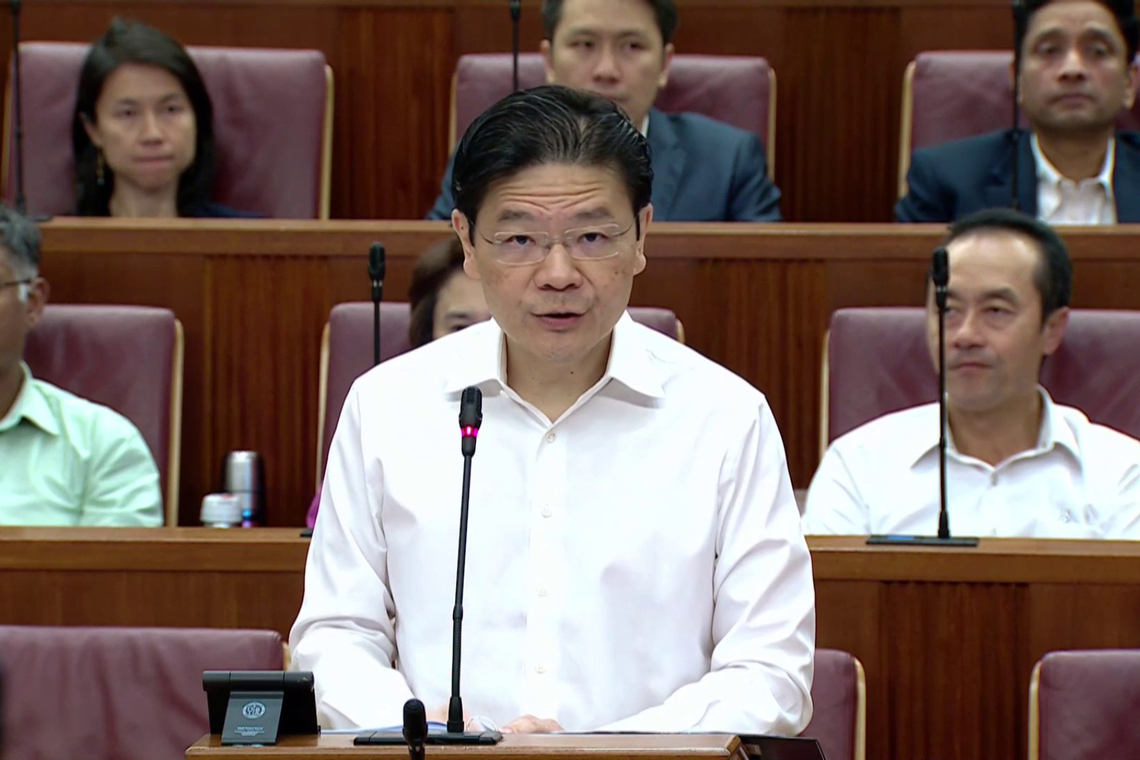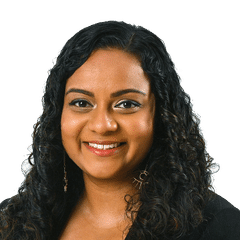PM calls on S’poreans to shape nation’s future together, assures young people they will not be left out
Sign up now: Get ST's newsletters delivered to your inbox

PM Lawrence Wong called on all Singaporeans to connect, collaborate and “shape our future together” so that the miracle of the last 60 years can continue.
PHOTO: MDDI
SINGAPORE - Singaporeans can expect more to be done to enhance social mobility, build a vibrant economy and strengthen solidarity, said Prime Minister Lawrence Wong in his maiden speech in the 15th Parliament on Sept 24.
To the young, he pledged: “We will not let you down. We are building Singapore for you, and with you.”
He called on all Singaporeans to connect, collaborate and “shape our future together” so that the miracle of the last 60 years can continue, even as the external environment is more contested, unpredictable and challenging for small states.
In a wide-ranging speech that spanned around 40 minutes, PM Wong also pledged to strengthen safety nets and deepen a sense of solidarity among Singaporeans as he outlined the broad strokes of the Republic’s path forward.
Amid stronger headwinds, a maturing economy and an ageing population, he noted, many young people worry that they may not do better than their parents.
They are also riddled with anxieties, stemming from worries about society becoming more stratified, where the rich are pulling ahead while others struggle to keep up.
PM Wong said to Singapore’s youth: “We will strive to create more fulfilling lives – for you. And not just for a few among you, but for all of you.”
The Government will do more to keep social mobility alive so that the “escalator keeps moving”, and everyone has the opportunity to realise their full potential, he said.
From early childhood to the workplace to retirement, the Prime Minister outlined the various ways in which the Government strives to achieve this.
First, more will be done for children
Early childhood initiative KidStart will be expanded, and support programmes for lower-income families like ComLink+ will be enhanced so that more families can get help earlier and more children can gain a stronger footing in life.
There will also be more support for children from disadvantaged backgrounds – whose attendance in pre-schools is less regular – through efforts that involve parents, pre-school operators and social service agencies to ensure these children get the consistent support they need to thrive.
Efforts will also be made to assure parents that they do not need to feel like they are “stuck on a treadmill, running harder in a bid to avoid falling behind”.
“I know for many parents, education still feels like an arms race,” PM Wong said.
“We must break this cycle,” he said, adding that this term of government will do more to reduce the stakes of single exams and broaden the definitions of success.
Reforms in education must also follow into the workplace, and Singapore has to change how people are hired and promoted, he said. This applies to the public service and the private sector.
While the Government has substantially raised the salaries of once undervalued but vital roles, such as pre-school teachers and allied health professionals, it will continue to professionalise skilled trades.
But while pay matters, mindset is also important, said PM Wong.
The deeper change must come from society, and a lot depends on how society as a whole views the different pathways people may choose, he added.
“We must move from a narrow meritocracy based solely on grades to a broader and more inclusive one,” he said. He noted that a strong and dynamic economy underpins the shift towards more pathways to success.
In pursuit of this, the Government will redouble efforts to keep the economy competitive and vibrant, and will work harder to energise the enterprise ecosystem.
While the goal is to make Singapore a more attractive place for start-ups and emerging global companies, not all enterprises will succeed, he cautioned, adding that “we must be prepared for more churn”.
Retirement adequacy will also be strengthened to ensure Singaporeans save more
The Government will also continue to strengthen safety nets for those who need more help.
Children with special needs will receive more support in their education and to make their transition to adulthood and work smoother; and people with disabilities will get more opportunities to pursue their aspirations and lead fulfilling lives.
Those who fall on hard times will get help “because setbacks are part of life, and in Singapore, everyone is due second and third chances”, he added.
This is why there are programmes like the SkillsFuture Jobseeker Support Scheme
PM Wong noted that Singapore is already successfully mitigating wealth inequality and the gap is narrowing – it is now at its lowest in more than two decades.
This has been achieved through measures like property taxes and stamp duties on transactions to ensure that those with more contribute more, and public housing and top-ups to CPF accounts to transfer to those with less.
“We will press on, and continue to innovate in our social policies,” he said.
PM Wong also reiterated the call to build a “we first” society
Even as Singapore works towards a fairer society, it has to accept the basic truth that not every journey will reach the same destination, he said.
The reality is that some skills and talents are always more in demand than others, and some jobs command higher pay.
He said: “But that’s why those who do better must never forget this: No one succeeds alone.”
Every fortunate person in Singapore owes a debt to the community and should contribute more – not just in taxes, but also in compassion and care.
But despite the bonds among Singaporeans being stronger than ever, he noted the low rates of volunteering among the young, whose friends consist mostly of others from the same socio-economic group or race as themselves.
“If we have less in common, then we risk seeing each other not as fellow citizens but as competitors – as people from different tribes. And competition can easily turn into envy, resentment and division,” he said.
While the Government will continue to work hard to build up social capital, bind communities together and connect Singaporeans regardless of race, language, religion or socio-economic background, society has to make an effort.
Singaporeans need to step out of their comfort zones, learn more about other cultures and interact with people from different backgrounds, he said.
PM Wong also called for constructive politics
While Singaporeans rejected calls to vote along racial and religious lines
But as elections become more tightly contested, the temptation to play the race and religion card will grow – and Singapore must find ways to guard against this, he said.
“Every election is a new test, and we must take nothing for granted,” said PM Wong, noting that society is maturing and Singapore’s politics is evolving.
He welcomed the Opposition’s presence in Parliament, adding that he fully expects the WP to keep the Government on its toes.
The party will try to build up its ranks and will one day want to take over from the PAP, “even if it may not say so openly now”, he said.
There will be consequences if any party falls short of the discerning public’s high expectations and standards, and the privilege given today can be easily taken away tomorrow, he added.
“Be it the PAP, WP or any other political party, we are all servants of the people – the final word rests with them.”
He called on Singaporeans to join the Government in shaping the future, adding that there are already many channels for public consultations.
In particular, the Government wants to involve young people, he said, and it will not let young Singaporeans down.
He encouraged them to work together to secure a brighter future for themselves.
“We need you, our young Singaporeans, to be the authors of this next chapter, to write what must become your Singapore Story,” said PM Wong.



